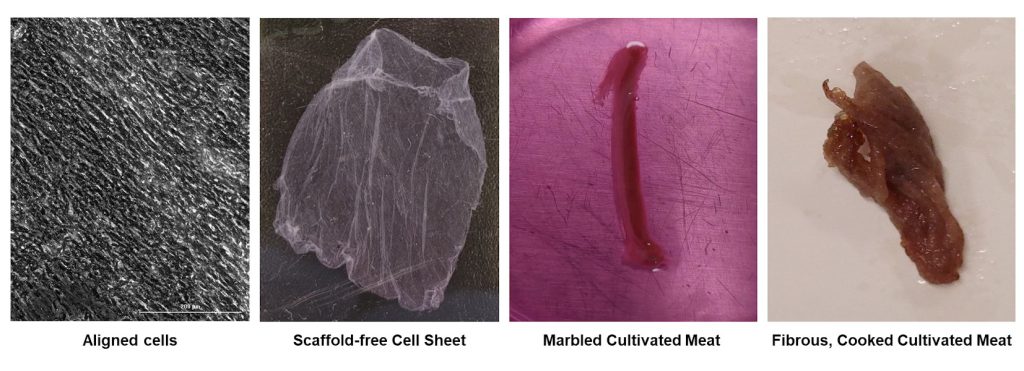Kitchener-Waterloo-based Evolved Meats claims that from only a few cells it can grow “whole cuts of real meat from any animal.”
Evolved Meats (formerly known as CaroMeats), is part of a growing group of cultivated meat companies that have sought to develop more sustainable, lab-grown methods of meeting global demand for meat—which represents a significant source of greenhouse gas emissions.
Amid an increasingly crowded sector, Evolved Meats co-founder and COO John Cappuccitti argues that the Canadian biotech startup’s technology is unique.
“The sustainability piece is just a nice cherry on top.”
-John Cappuccitti
“All of the other groups that started before us were always trying to answer the question, can we just get enough cells to make this work?” Cappuccitti told BetaKit in an interview. “We’re doing it fundamentally different[ly] … We took it from a position of, let’s assume the cells are in place, and we create the meat people want.”
Evolved Meats turns cells into whole cuts of meat using cell sheet tissue engineering, which does not harm animals, while also generating fewer greenhouse gases than traditional meat production.
While other companies have focused on the cell proliferation part of the equation, given that some have started to sell cells and the protocols for growing them, Evolved Meats opted to focus on the assembly side instead.
The startup’s approach was developed by Evolved Meats’ other co-founder, CEO Alireza Shahin, while he was studying for his PhD at Hamilton’s McMaster University and working in Dr. Ravi Selvaganapathy’s lab. At the time, Shahin was doing similar work in the field of tissue engineering and regenerative medicine, operating around drug discovery, before he realized that the same cell sheet engineering techniques he was developing could be applied to the cultivated meat space.
Shahin teamed up with Cappuccitti, the former director of University of Waterloo’s Velocity Incubator and Velocity Ventures, to do just that. Cappuccitti left Velocity in August 2021 to launch Evolved Meats, which was officially founded last September.
“The big problem with animal agriculture, not only is there a massive climate impact, but there’s also an animal welfare issue,” said Cappuccitti. “If we’re able to recreate meat exactly as it exists in conventional animals, we’re able to impact both of those mega trends quite massively.”

Last fall, the company raised $2 million CAD in equity seed financing led by Canada’s largest meat producer in Maple Leaf Foods. The round also saw support from New York-based alternative protein investment fund Big Idea Ventures, Kitchener-Waterloo’s Garage Capital, Hong Kong-based Saltagen Ventures—which specializes partly in AgTech—University of Waterloo’s Velocity Fund, and undisclosed strategic angels.
Maple Leaf Foods is one of North America’s largest poultry and pork producers. The company is also a market leader in producing plant-based proteins. According to outgoing Maple Leaf Foods CEO Michael McCain, the company’s vision is to be “the most sustainable protein company on earth.”
McCain added that Maple Leaf Foods’ investment in Evolved Meats fits within the firm’s commitment to supporting “promising new technologies with the potential to nourish people and protect the planet.” Maple Leaf Foods isn’t the only major meat producer to take a stake in an alternative meat startup: firms like JBS and Cargill have reportedly invested heavily in smaller companies in the plant-based protein and lab-grown meat space.
Demand for plant-based products masquerading as meat has cooled recently, which has led Maple Leaf Foods to reevaluate its approach to the sector, and California-based Beyond Meat’s share price to tumble.
Unlike Beyond Meat, Evolved Meats focuses on cultivated meat products—a sector which features players like California’s Upside Foods, which closed $400 million USD in Series C financing at an over $1 billion valuation last month. Upside claims to be the first cultivated meat startup to produce lab-grown meat from multiple species, including beef, chicken, and duck. For its part, Evolved Meats’ initial focus is on pork—the world’s most widely-eaten meat.
“When you look at the plant-based meat market, habituation has been a huge problem,” said Cappuccitti. “The example we always give is the uncanny valley. I think there’s an uncanny valley of food … If something seems off, it seems very off.”
Cappuccitti thinks this trend is primed to repeat itself in the cultivated meat space. Evolved Meats believes it can provide real value by focusing “on the long tail effort of recreating the actual meat” to mirror the fibrous texture, marbling, taste, mouthfeel, and nutrition of conventionally-produced meat.
The COO claims that other companies operating in the cultivated meat sector use processes that involve plant-based scaffolds, which Cappuccitti says introduces something “that’s not really in meat,” leading to an end product that usually contains less than 70 percent animal cells by composition.
Conversely, Evolved Meats products are made up of 100 percent animal cells. This is made possible by the startup’s approach, which enables animal cells to produce their own scaffolding. “We don’t think anybody else is doing that or can do that,” he added.
Since closing its seed round, Evolved Meats’ work has been focused on perfecting its tissue engineering technique, which involves bio-fabricating muscle tissues and recreating the muscle aging process. Now, the company is ready to invest in product development, scale up its production capabilities, and expand its team.
According to Cappuccitti, Evolved Meats still has “a lot” of capital left, and will likely return to fundraising early next year. In addition to its $2 million seed round, the startup has also secured $100,000 from SDTC last November, and $75,000 last week from Ontario Genomics and CFIN.
Evolved Meats plans to execute its first big product demonstration by the end of this year, where it intends to showcase a piece of pork belly “that should be perfect.”
In terms of its go-to-market strategy, the startup’s “first push” will involve working with incumbent meat companies to co-develop products. Further down the road, Evolved Meats sees potential to pursue a direct-to-consumer path.
Ultimately, Evolved Meats is catering to people who love meat but might be turned off by plant-based products. “The sustainability piece is just a nice cherry on top,” said Cappuccitti.
Feature image courtesy Stefanie Poepken via Unsplash.



